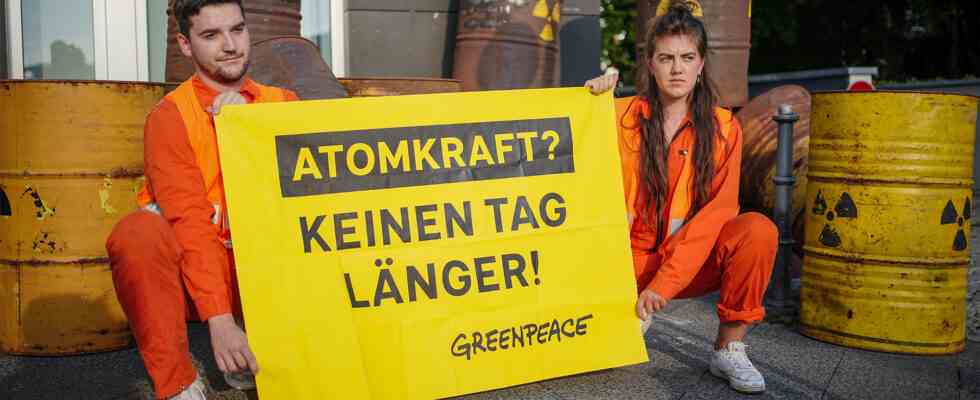Status: 09/19/2022 12:23 p.m
Anyone who invests in nuclear power plants or gas infrastructure will be doing something for the climate in future under the new EU rules. Environmentalists have sharply criticized this. You have now given the EU Commission an ultimatum – combined with the announcement of a lawsuit.
Several environmental organizations want to sue against new EU rules that classify nuclear power plants and gas infrastructure as climate-friendly projects from January. Among others, the WWF, Greenpeace and the BUND are calling on the EU Commission to withdraw the relevant regulation, as emerged from two communications.
Nuclear power and gas “climate-friendly” from January
The Brussels authorities now have until February to respond. Otherwise, the environmentalists want to go to the European Court of Justice (ECJ).
The background is the so-called taxonomy. In it, the Commission lists the areas in which citizens and companies can invest money to combat climate change.
EU taxonomy
The taxonomy is a system with which financial products are assessed in terms of their sustainability. The aim is for investors to invest their money in environmentally and climate-friendly economic sectors.
In February, the EU Commission passed the current regulation that classifies nuclear and gas as sustainable. In July, the EU Parliament approved this regulation.
From January, nuclear power and gas will also be named as climate-friendly under certain conditions. This is controversial because burning gas produces climate-damaging carbon dioxide and there is no definitive solution to radioactive waste from nuclear power plants.
Environmentalists suspect violation of EU laws
The EU countries and the EU Parliament had agreed to the classification. Eight Greenpeace offices, including the German one, objected to the classification. It violates European climate laws and the principles of taxonomy itself, it said in a statement.
In addition, it contradicts the goals of the Paris climate agreement to limit the rise in temperature to 1.5 degrees if possible. “With this taxonomy, the EU reveals the environmental and climate goals it has set itself,” said Martin Kaiser, board member of Greenpeace Germany.
Supported by expert opinions
Greenpeace sees its assessment of gas and nuclear supported by two new reports. A report by Aurora Energy Research on the subject of gas shows that with the taxonomy that will apply from 2023, Europe would “tie itself to the climate-damaging energy source gas and slow down the energy transition” in the long term.
A second study by the physicist Oda Becker shows that new nuclear power plants undercut the European goal of being climate-neutral by 2050 and therefore cannot be a transitional technology.
repeal legal act
Therefore, the Greenpeace country offices are calling for the relevant legal act to be repealed. Otherwise, Greenpeace will file a complaint with the European Court of Justice, said Kaiser.
WWF, BUND and two other organizations also filed a motion specifically to challenge the inclusion of gas in the taxonomy. The gas industry is at the center of the cost-of-living crisis in the EU given the high prices, and its promotion undermines the EU’s energy transition goals, said a spokesman for the organizations.
The goal is to “stop greenwashing and to preserve the credibility of the entire EU taxonomy,” said the WWF in Berlin, emphasizing that fossil gas is not sustainable.
Leaving the advisory platform
Another group of environmentalists, including Robin Wood, filed an annulment action before the ECJ on Friday. In particular, this challenges the climate-friendly classification of bioenergy and forestry projects, as this drives forest destruction and increases CO2 emissions.
The EU Commission must ensure that there are no financial incentives for industrial heating of the forests, said Jana Ballenthien from Robin Wood. In the past week, several organizations such as the WWF had also resigned in protest from the advisory platform that had developed the taxonomy together with the commission.
They criticized that the authority had intervened in their work for political reasons and ignored the advisers’ recommendations contrary to scientific evidence.

